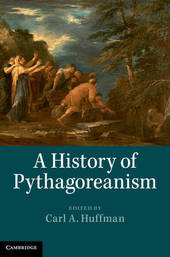
|
A History of Pythagoreanism
Hardback
Main Details
| Title |
A History of Pythagoreanism
|
| Authors and Contributors |
Edited by Carl A. Huffman
|
| Physical Properties |
| Format:Hardback | | Pages:530 | | Dimensions(mm): Height 235,Width 157 |
|
| Category/Genre | Western philosophy - Ancient to c 500 |
|---|
| ISBN/Barcode |
9781107014398
|
| Classifications | Dewey:182.2 |
|---|
| Audience | | Tertiary Education (US: College) | |
|---|
| Illustrations |
1 Line drawings, black and white
|
|
Publishing Details |
| Publisher |
Cambridge University Press
|
| Imprint |
Cambridge University Press
|
| Publication Date |
24 April 2014 |
| Publication Country |
United Kingdom
|
Description
This is a comprehensive, authoritative and innovative account of Pythagoras and Pythagoreanism, one of the most enigmatic and influential philosophies in the West. In twenty-one chapters covering a timespan from the sixth century BC to the seventeenth century AD, leading scholars construct a number of different images of Pythagoras and his community, assessing current scholarship and offering new answers to central problems. Chapters are devoted to the early Pythagoreans, and the full breadth of Pythagorean thought is explored including politics, religion, music theory, science, mathematics and magic. Separate chapters consider Pythagoreanism in Plato, Aristotle, the Peripatetics and the later Academic tradition, while others describe Pythagoreanism in the historical tradition, in Rome and in the pseudo-Pythagorean writings. The three great lives of Pythagoras by Diogenes Laertius, Porphyry and Iamblichus are also discussed in detail, as is the significance of Pythagoras for the Middle Ages and Renaissance.
Author Biography
Carl A. Huffman is Research Professor and Emeritus Professor of Classical Studies at DePauw University. He is author of Archytas of Tarentum: Pythagorean, Philosopher, and Mathematician King (2005) and Philolaus of Croton: Pythagorean and Presocratic (1993).
Reviews'... The book is remarkably comprehensive in its scope, and each chapter serves as a summary of primary texts and secondary scholarship on each respective subject. As a result, the volume is an excellent resource for specialists and novices alike. Anyone interested in the history of philosophy, of mathematics, of music and harmonics, or of the Pythagorean tradition as a whole should utilize this volume.' Justin M. Rogers, Bryn Mawr Classical Review
|